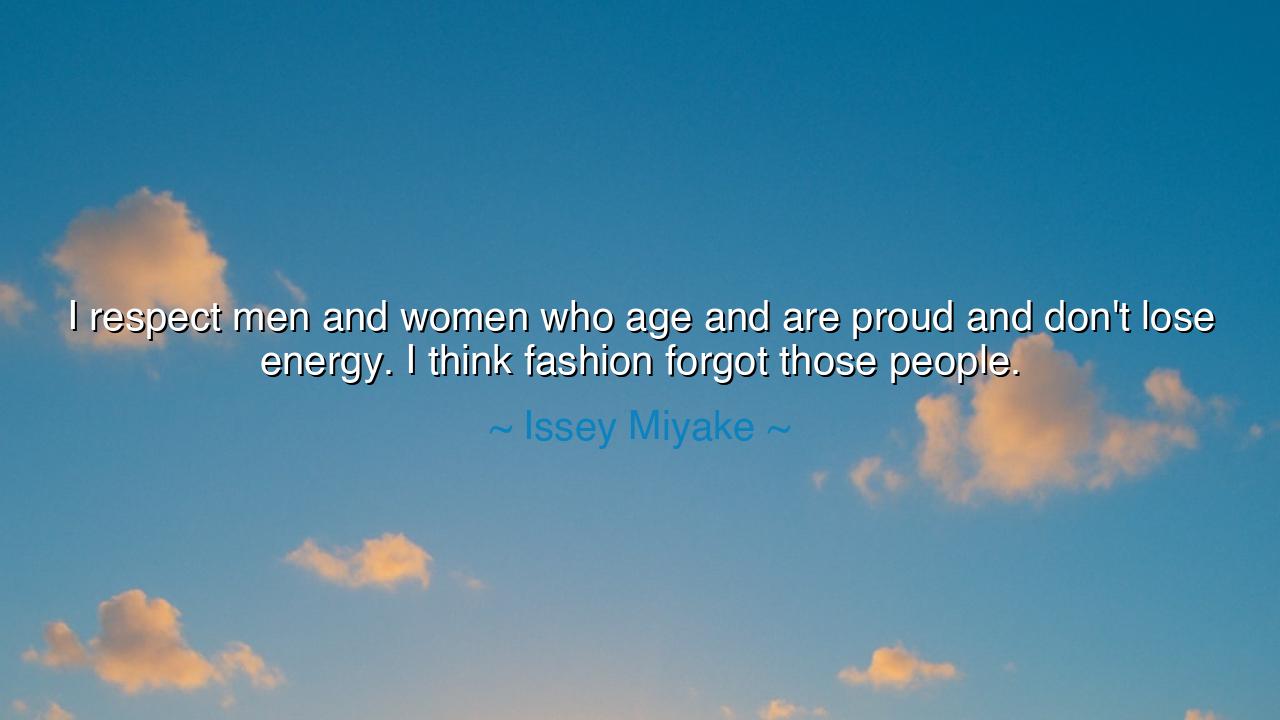
I respect men and women who age and are proud and don't lose
I respect men and women who age and are proud and don't lose energy. I think fashion forgot those people.






In the words of Issey Miyake, “I respect men and women who age and are proud and don't lose energy. I think fashion forgot those people.” These words rise like a quiet challenge to the shallow obsessions of the modern world. Miyake, a designer whose art was shaped by both tradition and futurism, speaks not only of fashion, but of the spirit of humanity itself. He calls upon us to honor those who carry the marks of time with grace and power—to remember that beauty does not fade with age, but transforms, deepens, and glows from within. In an age that worships the fleeting bloom of youth, Miyake reminds us that the true masterpiece is the soul that endures, not the body that glitters.
Born in Japan and forged in the shadows of post-war rebuilding, Issey Miyake understood the strength that rises from fragility. His designs celebrated both innovation and imperfection; he saw fabric as a living form that moved with the human body, not one that sought to imprison it. When he speaks of those who “age and are proud,” he speaks of men and women who, like his garments, embrace the natural folds of life—who allow their wrinkles to be like the pleats of his iconic creations: flexible, expressive, alive. He saw beauty in resilience, in the quiet dignity of those who continue to create, to dance, to work, to dream, long after the world has told them their season has passed.
The fashion world, which often chases the ephemeral, has too often forgotten such souls. It celebrates the flawless skin of the young while overlooking the fire of those whose lives have been lived with courage. But Miyake’s philosophy was different. He saw age as art—the sum of experience etched upon the body, the evidence of laughter, sorrow, survival. He revered those who carried their years not as burdens but as ornaments. To him, every wrinkle was a line of poetry, every gray hair a brushstroke of time’s wisdom. Where the world saw decline, he saw continuity, the seamless weaving of past and present into something enduringly beautiful.
Consider the figure of Sophia Loren, who once said, “There is a fountain of youth: it is your mind, your talents, the creativity you bring to your life.” Loren, like Miyake’s ideal, never denied her age. Instead, she wore it like armor, her grace sharpened by time. Her beauty did not fade—it evolved, becoming more powerful precisely because it was real. In her, as in Miyake’s vision, we see that age does not diminish energy—it refines it, distills it into something potent, unshakable, and wise.
The ancients, too, revered such strength. In Greece, the elder was not cast aside but honored as the keeper of knowledge. The gray-haired philosopher, the seasoned warrior, the mother who had weathered loss and love—these were the pillars upon which society stood. They knew that youth brings speed, but age brings direction; that energy without wisdom is wild, but wisdom without energy is still luminous. Miyake’s lament that “fashion forgot those people” is thus a lament for our culture at large—for a world that measures worth by surface and novelty, forgetting that true artistry lies in longevity and soul.
Yet there is hope in his words, too. They call us to remembrance—to restore honor to age, to celebrate vitality that flows from spirit, not appearance. Let the young not fear growing older; let the old not apologize for having lived. Instead, let every stage of life claim its own splendor. As Miyake’s creations blended tradition with innovation, so too must our culture blend reverence for age with the curiosity of youth. For it is in this harmony that true beauty dwells.
The lesson, my child, is simple yet profound: do not fear the passing of time—fear only the loss of passion. Age is not the dimming of the flame, but the steadying of its light. Wear your years as garments woven by experience. Move through life with the same energy that once carried you through youth, but now tempered with wisdom and compassion. Remember those, like Issey Miyake, who saw art not in perfection, but in persistence—in the continued act of creation against the erosion of time.
For when the world forgets the beauty of age, it forgets the truth of life itself. So live, love, create, and grow older proudly. Let your energy be your rebellion, your dignity your style. And when others chase the illusion of eternal youth, be as the oak that stands unshaken—rooted, graceful, and strong in the eternal fashion of the soul.






AAdministratorAdministrator
Welcome, honored guests. Please leave a comment, we will respond soon